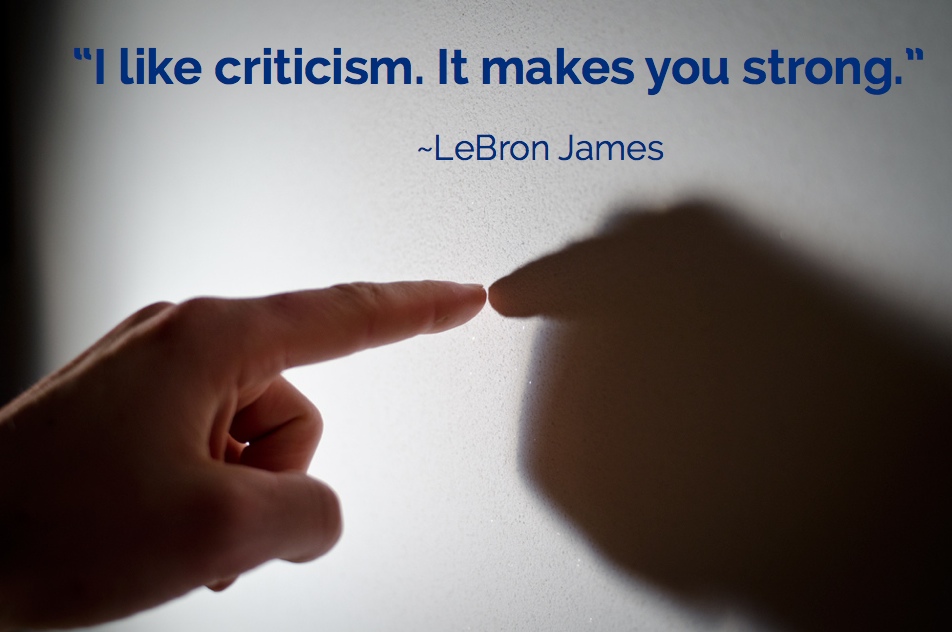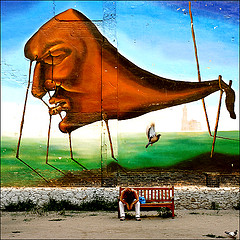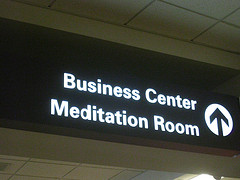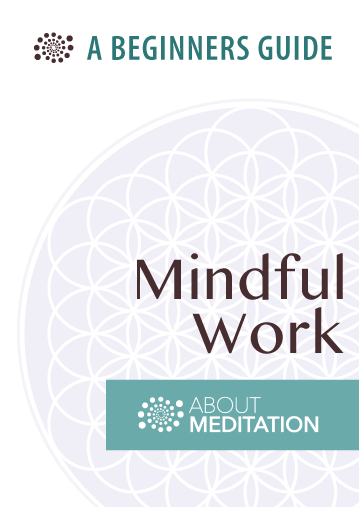
Criticism may not be agreeable, but it is necessary. It fulfills the same function as pain in the human body. It calls attention to an unhealthy state of things. ~Winston Churchill
Criticism. Yuck! I don’t know many people who enjoy or embrace it. Do you like criticism? I sure don’t. It’s always a bitter pill to swallow. But the truth is, feedback and criticism can help us grow. Thoughtful and caring criticism expands our horizons and helps us see beyond our blinkered views.
Unless you want to live in a closet for the rest of your life, it’s pretty hard to avoid feedback and criticism. For better and for worse, it’s part of the human experience. Life offers us a daily serving of it whether we like it or not. But according to many schools of thought, criticism is a powerful teacher.
Becoming Bitter Or Better?
So how can you embrace criticism? And where does mindfulness fit in?
Author and leadership advisor Robin Sharma said it this way, “Negative feedback can make us bitter or better.”
In this post, we explore how accepting criticism can make us better. Personally, I’ve found that mindfulness is an effective tool to help me embrace criticism with interest. It allows me to rise above my predictable yet reptilian fight or flight response to negative feedback.
And there’s no doubt, seeing myself through the reflection of others has been one of the greatest catalysts for growth. I can see and understand things about myself that would be more or less impossible left to my own devices.
In recent years, at top leadership schools and among management experts, there’s been much discussion and research into how best to give and receive criticism. Done the right way, it can inspire growth and development. But if it’s not informed by sensitivity and balanced with positive support, it can have the opposite effect.
This recent Fast Company article explores the art and science of giving and receiving criticism at work. It even highlights how one business is trying to “make the experience [of constructive criticism] less scary and more loving.” For anyone interested in growth, it’s an important topic.
What Does Criticism Feel Like?
 So let me ask you. Have you ever paid attention to what happens when you get criticism? It’s actually fascinating. And science helps to explain it.
So let me ask you. Have you ever paid attention to what happens when you get criticism? It’s actually fascinating. And science helps to explain it.
You may be surprised to learn that there are good reasons for our resistance to criticism. It turns out that when the critic calls, you are biologically wired to shut down. The brain is actually designed to protect us from criticism because it taps into ancient survival fears, like being ostracized from the tribe.
So you can take heart, it may be your brain chemistry more than your pride that compels you to spontaneously combust rather than sit there and listen to what you’ve done wrong.
This resonates with my own experience. I’ve noticed that in the face of negative feedback, my perception gets distorted. I get insecure and my view of myself and the world shrinks. In a word, I get self-conscious. I feel like I am the baddy and everyone else knows it. It’s certainly not pleasant. Sometimes, you might even feel rage, resentment, and righteous indignation.
So it goes without saying, criticism can trigger strong emotions in us all. And that’s to say nothing about the critic’s motives. Do they have your best interests in mind? Not always, that’s true, but let’s give them the benefit of the doubt for now. Truth is, most of us aren’t objective about that when we are on the receiving end.
How Can Mindfulness Help You Embrace Criticism?

First, let’s look at the science. As mindfulness advocate and author Ruby Wax writes in her best-selling book Sane New World, “Mindfulness activates the ‘rest and digest’ part of our nervous system and increases blood flow to parts of our brain that help us regulate our emotions such as the hippocampus, anterior cingulate cortex, and the lateral parts of the prefrontal cortex. Our heart rate slows, our respiration slows, and our blood pressure drops.”
Neuroscience shows us that meditation and mindfulness can increase the grey matter in different parts of the brain. Two areas of the brain positively affected by meditation and mindfulness are the Anterior Cingulate Cortext (ACC) and the hippocampus. The ACC is responsible for self-regulation. The hippocampus is associated with emotion, self-awareness, introspection, and compassion.
Mindfulness, it turns out, may help you build and activate the parts of your brain that not only keep you from lashing out, pushing back, and being defensive in the face of criticism. It can also enhance your capacity to consider the evidence and learn from it.
5 Ways That Mindfulness Can Help You Accept Criticism
1. Stop and Breathe
 When you take a deep breath, you connect again to your body. You instantly ground yourself in the moment and root yourself to the earth. When you get criticism, it can trigger the stress hormone cortisol which narrows your view into a fight or flight context. It blinds you. Suddenly you can find yourself seeing the other person as a mortal threat that you need to kill or run from.
When you take a deep breath, you connect again to your body. You instantly ground yourself in the moment and root yourself to the earth. When you get criticism, it can trigger the stress hormone cortisol which narrows your view into a fight or flight context. It blinds you. Suddenly you can find yourself seeing the other person as a mortal threat that you need to kill or run from.
Taking a few deep breaths, as the saying goes, can change everything.
2. Slow Down
Too often we shut down, defend, and resist in the face of criticism. But mindfulness can help you strengthen the parts of the brain that support your capacity to stop, slow down, listen, absorb, and breathe. Frankly, it’s amazing what slowing down can do. Slowing down will keep you from saying or doing things you may later regret.
And now that you’ve pushed the pause button on your desire to throw the offending critic out the window, a whole range of other possibilities kick into gear.
3. Listen
First, you can slow down and repeat the feedback to the person who shared it with you. A small but mindful act like this can do wonders. It allows you to reclaim control of your rational faculties. You can start to relate to the actual information and not only your primitive response to it.
Often we can’t even hear what the other person is saying because we are in the tunnel vision of our fight or flight response. But if you pause, wait, and listen, good things can happen. You’ll actually hear what they are saying.
4. Observe Your Response
 Mindfulness is about being present with what is and not reacting out of hand. If you can actually be interested in your emotional response, it will help to tame it too. According to Ruby Wax, “Researchers at UCLA found that when people become aware of their anger and label it as ‘anger,’ the amygdala, the part of the brain that generates negative emotion, calms down.”
Mindfulness is about being present with what is and not reacting out of hand. If you can actually be interested in your emotional response, it will help to tame it too. According to Ruby Wax, “Researchers at UCLA found that when people become aware of their anger and label it as ‘anger,’ the amygdala, the part of the brain that generates negative emotion, calms down.”
When you observe your responses, you start to transcend them. That process can remind you there is more to this moment than your natural contraction. Then, you can ride it out and make space for some of your higher brain functions to kick in.
5. Consider The Information
Being mindful of all your responses, breathing, slowing down, listening…all of these put you in the position of being able to actually respond to the evidence. You need to find some solid ground under your feet so you can consciously engage with and consider the feedback. Mindfulness helps you to do that.
And as soon as you do, you’re already diverting energy and attention away from your stress induced responses. You’ll be able to consider the other person and where they’re coming from. You can appreciate that they might actually have your best interests in mind. And, they may actually have a point!
How Do You Build Your Capacity for Mindfulness?
Following these 5 mindful steps isn’t exactly easy. I know that. It takes effort and practice to break our habitual and reactive responses to feeling threatened. So Here’s a valuable tip. One effective to build your capacity for mindfulness is to start meditating.
Meditation and mindfulness are two sides of the same coin. When you meditate, you ground yourself in the calm center of your own being. A daily meditation practice can help you stay rooted in that calm center when your emotions start to red line. I like to think of it this way, meditation is the way you charge the battery of your mindful presence. You check out our series on how to make meditation a daily habit here.
Mindfulness At Work & Home
 In a professional context, being mindful in this way is so important. You grow and build trust with coworkers when you can accept criticism and respond productively. As a leader, your ability to accept criticism affects the organizational culture. Will you be bitter or better? The answer could define the destiny of your organization.
In a professional context, being mindful in this way is so important. You grow and build trust with coworkers when you can accept criticism and respond productively. As a leader, your ability to accept criticism affects the organizational culture. Will you be bitter or better? The answer could define the destiny of your organization.
I once worked in an organization which had a culture of fear. One of the main reasons for this disfunction was that our leader couldn’t accept criticism without retribution. The cost was huge. Our organization collapsed as a result.
There’s no doubt, accepting criticism is important for the tone and tempo of your organizational culture. It demonstrates humility and gives everyone permission to be human. And it’s important for the survival of your work, whether your organization is religious, a non-profit business, a for-profit business, a band, or any other group endeavor.
Likewise, these mindfulness skills are crucial at home. I probably don’t need to tell you that. But I can’t tell you how many times I have avoided saying really stupid things by just stopping, slowing down, and breathing in the face of criticism.
Mindfulness, and this capacity to accept feedback, may well be one of the most important relational skills you can bring to the table. Invariably, practicing these five mindful steps leads to deeper trust, intimacy, and growth with my partner. I don’t always like what I hear, but 90% of the time, history shows that she was right. And it’s hard to argue with the data.
So love it or hate it, criticism is part of life. Next time it happens, think about these mindful steps. You may be surprised to find how different the outcome can be when you just plant your feet, slow down, and breathe in the face of it. No, you’re not going to die. In fact, you’re probably going to thrive.
Pick up tips on mindfulness and learn how to meditate with our free How To Meditate Mini Course.
(Photo Credits via Flickr Creative Commons: David Gabriel Fischer, Matt Deavenport, Brian Carson, premasagar, Jef Safi, brownpau)




Interesting topic .
Criticism can build and it can also destroy you.
We are living in the world whereby criticism has become part of us. No matter what you do , whether good or bad, criticism is always there.
Through criticism we can improve a lot , in our lives, workplace , home, relationships and the list goes on or we can go down the drain.
In the beginning its hard to accept criticism, but with experience you learn to accept in a very critical way. For me is like what is this person saying to me, what message is this person trying to convey to me. It makes me to listen attentively and also to make an introspection about myself or about what I am doing. If it is repeatedly done, it further says to me that something needs to be urgently done or else?
In criticism I take what will build me, and throw away what will destroy me. If none of them is applicable, I just don’t do anything about it but throw it in a trash.
It also has to do with choice.
Hi Marilyn, Thanks for sharing your thoughts on this. And yes, I agree, it’s really a delicate line to walk re giving and receiving criticism, which is a big reason why I wrote this article. I think you do a really nice job expressing and bringing more nuance to the “Bitter or better” response that Robyn Sharma is talking about.